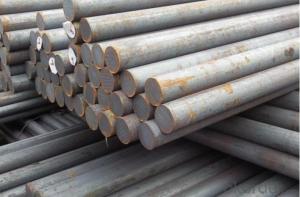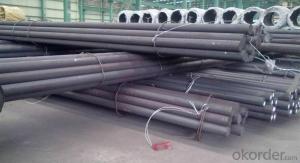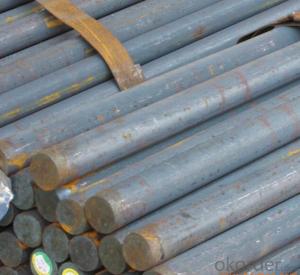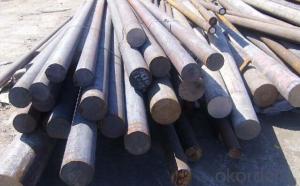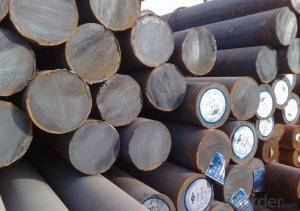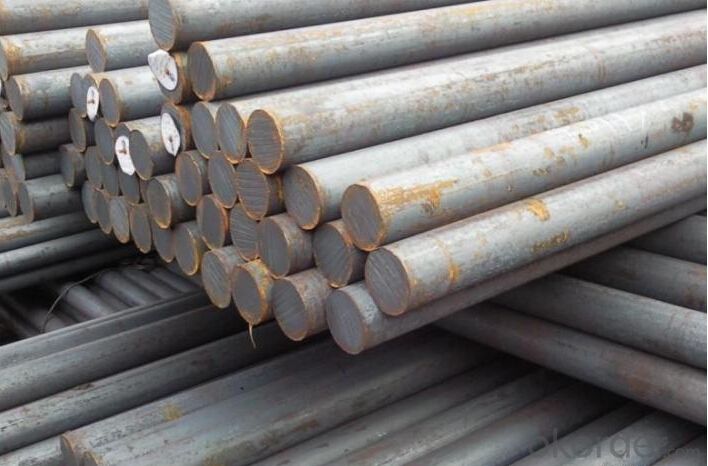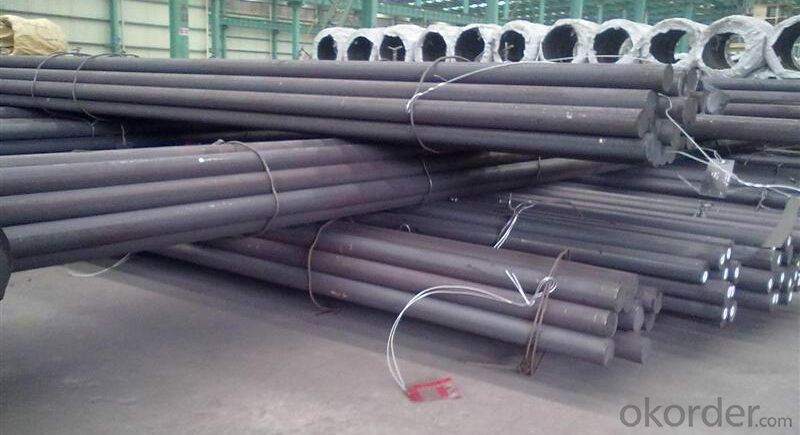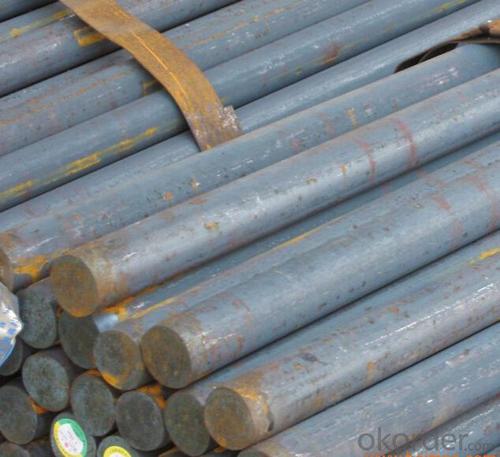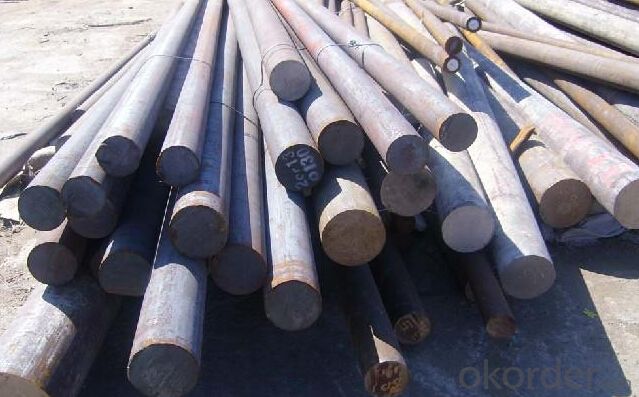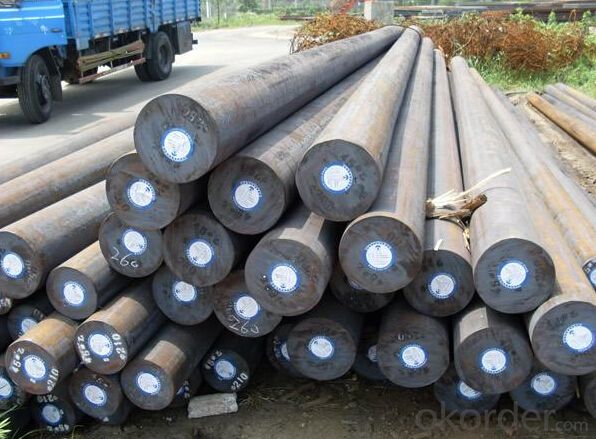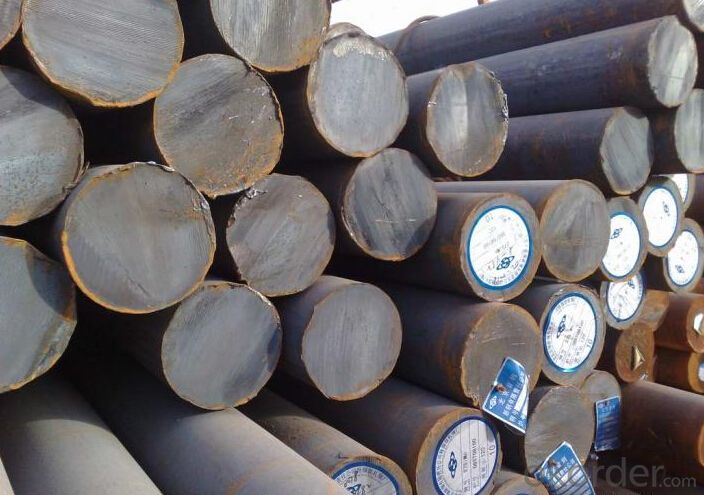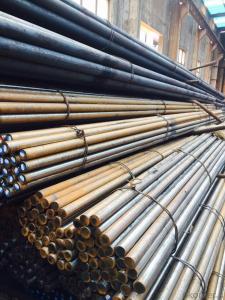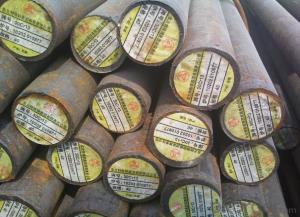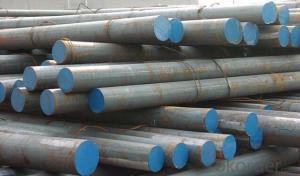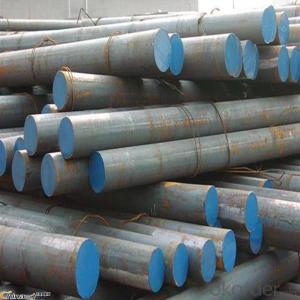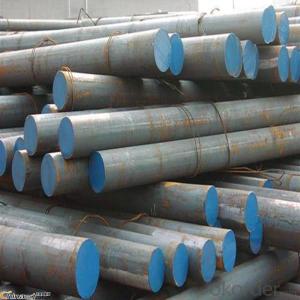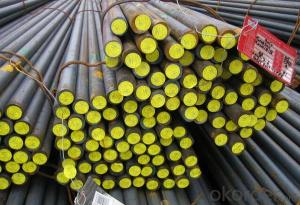Grade SAE 4140 Steel Price Steel Round Bar
- Loading Port:
- Shanghai
- Payment Terms:
- TT or LC
- Min Order Qty:
- 3 m.t.
- Supply Capability:
- 10000 m.t./month
OKorder Service Pledge
OKorder Financial Service
You Might Also Like
Specification
Grade SAE 4140 Steel Price_Steel Round Bar
Details of Grade SAE 4140 Steel Price_Steel Round Bar
Name | Steel Round Bar |
Shape | Round Bar/Square Bar/Flat Bar/Plate/Wire |
Standard | GB/ASTM/SAE/AISI/DIN/JIS/EN/BS |
Surface Treatment: | Black/Peeling/Polished/Machined |
Delivery Condition: | Hot Rolled or Forged/Peeled or Black Surface |
Test | SGS/UT 100% Elements Testing |
Certificate: | ISO/Mill Certificate |
Service: | 24 hours online service / |
more than 20 years trading and manufacture | |
Quality Assurance: | the third party inspection, such as SGS, BV, TUV…etc. is acceptable |
Packaging Details: | Seaworthy Packaging or as per customer's packing instruction |
Specification of AISI1045_Din1.1191_JIS s45c_GB45 Hot Rolled Carbon Steel Round Bar
1.Size of 4140 Steel Round Bar | ||||||||
Round bar | Diameter(mm) | Length (mm) | ||||||
20~800 | 3000~9000 | |||||||
Plate | Thickness(mm) | Width (mm) | Length (mm) | |||||
Max:800 | Max:2200 | Max:9000 | ||||||
The specification can be customized. | ||||||||
2.Chemical Compositons | ||||||||
Grade | C | Si | Mn | P | S | Cr | Mo | Ni |
42CrMo | 0.38~0.45 | 0.17~0.37 | 0.50~0.8 | ≤0.035 | ≤0.035 | 0.9~1.2 | 0.15-0.25 | ≤0.3 |
4140 | 0.40~0.45 | 0.15~0.35 | 0.75~1.0 | ≤0.035 | ≤0.040 | 0.8~1.1 | 0.15-0.25 | - |
SCM44 | 0.38~0.43 | 0.15~0.35 | 0.60~0.9 | ≤0.030 | ≤0.030 | 0.9~1.2 | 0.15-0.30 | ≤0.25 |
1.7225 | 0.38~0.45 | ≤0.40 | 0.60~0.9 | ≤0.025 | ≤0.035 | 0.9~1.2 | 0.15-0.30 |
|
3.Features of 4140 alloy steel | ||||||||
1. Chromium molybdenum alloy steel | ||||||||
2. Slightly higher carbon content then 4130 | ||||||||
3. Greater strength and heat treatment | ||||||||
4.Typical Applications | ||||||||
1. Applications in the oil and gas sector | ||||||||
2. Connection rods, collets, conveyor pins, | ||||||||
3. Gears, stem assemblies, | ||||||||
4. Pump shafts and tool holders | ||||||||
CNBM Introduction of AISI1045_Din1.1191_JIS s45c_GB45 Hot Rolled Carbon Steel Round Bar Supplier
CNBM International Corporation is the most import and export platform of CNBM group(China National Building Material Group Corporation) ,which is a state-owned enterprise, ranked in 270th of Fortune Global 500 in 2015.
With its advantages, CNBM International are mainly concentrate on Cement, Glass, Iron and Steel, Ceramics industries and devotes herself for supplying high quality series of refractories as well as technical consultancies and logistics solution.
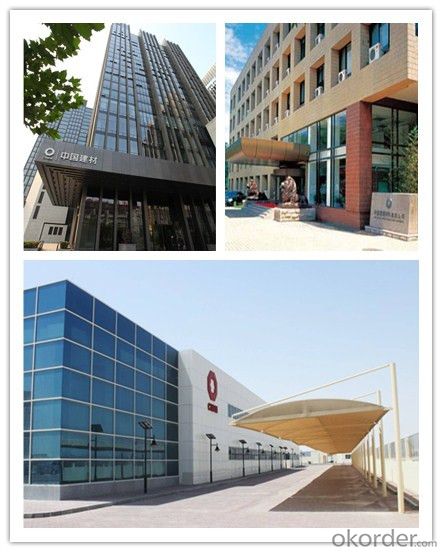
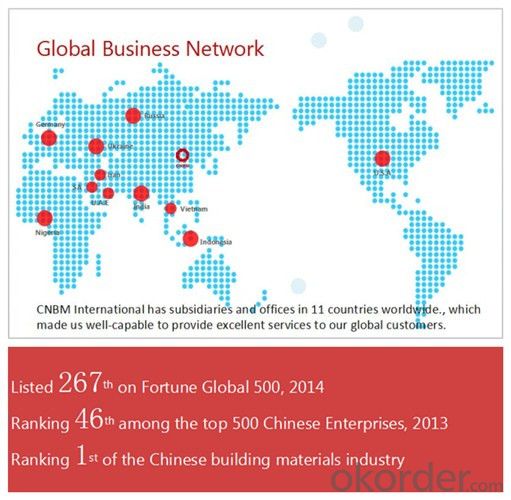
After-sale service |
|
Advantages
|
|
Packaging & Delivery AISI1045_Din1.1191_JIS s45c_GB45 Hot Rolled Carbon Steel Round Bar
Packaging Detail | Sea worthy packing /as per customer's packing instruction |
Delivery Detail | 15 ~ 40 days after receiving the deposit |
Products Show
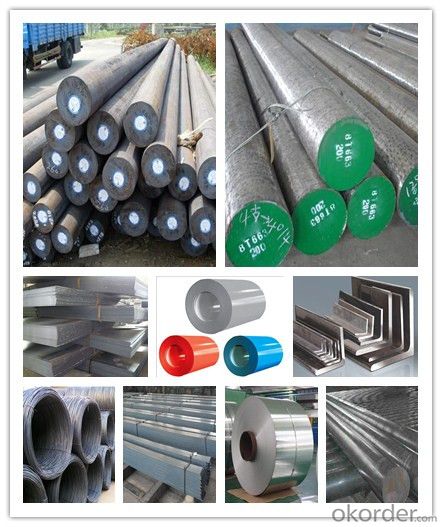
FAQ:
Are you a trading company or manufacturer? | Manufacturer |
What’s the MOQ? | 3 metric ton |
What’s your delivery time? | 15-35 days after downpayment received |
Do you Accept OEM service? | Yes |
what’s your delivery terms? | FOB/CFR/CIF |
What's the Payment Terms? | 30% as deposit,70% before shipment by T/T |
Western Union acceptable for small amount. | |
L/C acceptable for large amount. | |
Scrow ,Paybal,Alipay are also ok | |
Why choose us? | Chose happens because of quality, then price, We can give you both. Additionally, we can also offer professional products inquiry, products knowledge train (for agents), smooth goods delivery, excellent customer solution proposals. |
What's your available port of Shipment? | Main Port, China |
What’s your featured services? | Our service formula: good quality+ good price+ good service=customer's trust
|
Where are your Market? | Covering more than 160 countries in the world |
- Q: How does special steel resist oxidation at high temperatures?
- Special steel resists oxidation at high temperatures due to the presence of specific alloying elements and a carefully controlled manufacturing process. These alloying elements, such as chromium, nickel, and aluminum, form a protective oxide layer on the surface of the steel when exposed to oxygen in the air. This oxide layer acts as a barrier, preventing further oxidation of the steel. Chromium is particularly effective in forming a stable and dense chromium oxide layer, which acts as a self-healing mechanism. This means that if the oxide layer is damaged or scratched, it will quickly regenerate and continue to protect the steel from further oxidation. Furthermore, the manufacturing process of special steel involves precise control of the composition and heat treatment. This ensures that the steel has a fine and uniform microstructure, minimizing the presence of impurities or defects that could accelerate oxidation. Additionally, the steel is often subjected to various heat treatments, such as annealing or quenching, which further enhance its resistance to oxidation. Overall, the combination of alloying elements, controlled composition, and specific manufacturing processes enable special steel to resist oxidation at high temperatures, making it ideal for applications in industries such as aerospace, power generation, and petrochemical.
- Q: What are the main advantages of using special steel in the medical field?
- The main advantages of using special steel in the medical field include its high strength and durability, excellent corrosion resistance, biocompatibility, and ease of sterilization. These properties make special steel ideal for manufacturing surgical instruments, implants, and medical devices that need to withstand rigorous use, maintain their shape and performance over time, and ensure patient safety and comfort.
- Q: What are the properties of free-cutting steel?
- Free-cutting steel is a type of steel that is specifically designed to enhance machinability, making it easier to cut and shape with minimal effort. It possesses certain properties such as high sulfur content, which promotes the formation of manganese sulfide inclusions, improving chip formation during machining. It also typically contains elements like phosphorus, lead, or bismuth, which act as lubricants and reduce friction during cutting operations. Additionally, free-cutting steel has excellent surface finish, good dimensional accuracy, and high production efficiency, making it widely used in industries where machining speed and efficiency are crucial.
- Q: Can special steel be used in the oil and gas equipment manufacturing industry?
- Yes, special steel can be used in the oil and gas equipment manufacturing industry. Special steel, such as stainless steel or alloy steel, offers high strength, corrosion resistance, and durability, making it suitable for various applications in the oil and gas sector. It is commonly used in the manufacturing of pipes, valves, fittings, and other critical components that can withstand harsh operating conditions and prevent leakage or failure.
- Q: What are the different surface treatments for special steel?
- For special steel, there exist various surface treatments that serve distinct purposes and offer unique benefits. Some commonly employed surface treatments include: 1. Galvanization, which entails coating the steel with a layer of zinc, providing exceptional corrosion resistance. Galvanization proves popular for outdoor applications exposed to moisture and harsh environmental conditions. 2. Powder coating, involving the application of a dry powder to the steel surface, which is then heated and cured to form a durable and protective coating. This treatment offers excellent resistance against corrosion, chemicals, and UV rays, making it ideal for automotive parts, appliances, and outdoor furniture. 3. Nitriding, a surface hardening treatment that diffuses nitrogen into the steel surface. Nitriding significantly enhances surface hardness, wear resistance, and fatigue strength. It finds common use in high-performance components like gears, crankshafts, and injection molding screws. 4. Electroplating, where a layer of metal such as chromium, nickel, or gold is deposited onto the steel surface through an electrochemical process. This treatment improves appearance, corrosion resistance, and wear resistance. Electroplating is often employed for decorative purposes or to enhance component performance in various industries. 5. Passivation, a chemical treatment that eliminates iron contaminants from the steel surface, creating a passive oxide layer. This layer acts as a barrier against corrosion, enhancing resistance to rust and other forms of degradation. Passivation is commonly used for stainless steel components in industries like food processing, pharmaceuticals, and medical devices. 6. Carbonitriding, a surface treatment that introduces carbon and nitrogen into the steel surface at high temperatures. This process forms a hardened case, improving wear resistance and fatigue strength. Carbonitriding finds frequent application in high-stress components such as gears, crankshafts, and camshafts. These examples represent just a fraction of the available surface treatments for special steel. The choice of treatment depends on factors like desired properties, application requirements, and budget constraints. Consulting experts or manufacturers is crucial for determining the most suitable surface treatment for specific steel applications.
- Q: What are the common challenges in forging special steel?
- Common challenges in forging special steel include achieving the desired grain structure, maintaining uniformity and consistency throughout the material, controlling the temperature during the forging process, preventing cracks and defects, and ensuring proper heat treatment for the desired mechanical properties.
- Q: How does special steel perform in terms of hardness?
- Special steel is known to exhibit excellent hardness properties due to its unique composition and manufacturing processes. It is specifically designed to have a higher level of hardness compared to regular steel, making it extremely resistant to wear, abrasion, and deformation.
- Q: What are the different methods of surface laser cladding for special steel?
- There are several different methods of surface laser cladding that can be used for special steel. One common method is powder-based laser cladding. In this process, a powder material is injected into the laser beam, which melts and fuses with the surface of the special steel. The powder material can be chosen to provide specific properties such as enhanced hardness or corrosion resistance. This method allows for precise control over the thickness and composition of the cladding layer. Another method is wire-based laser cladding. In this process, a wire material is fed into the laser beam, which melts and fuses with the special steel surface. Wire-based laser cladding is often used for larger areas or when a thicker cladding layer is required. It is also commonly used for repairing or salvaging worn or damaged parts. A third method is direct energy deposition (DED) laser cladding. This method involves using a laser beam to melt a powder or wire material as it is being deposited onto the special steel surface. DED laser cladding allows for rapid build-up of multiple layers and is often used for additive manufacturing or repairing high-value components. Each method of surface laser cladding has its own advantages and limitations, and the choice of method depends on factors such as the desired cladding thickness, material properties, and the specific requirements of the application.
- Q: How does special steel contribute to product innovation?
- Special steel contributes to product innovation in several ways. Firstly, its unique properties such as high strength, durability, and resistance to corrosion enable manufacturers to develop new and improved products that can withstand harsh conditions and offer enhanced performance. Secondly, special steel's flexibility and versatility allow for the creation of complex shapes and designs, enabling the development of innovative and aesthetically pleasing products. Additionally, the use of special steel in product manufacturing can lead to advancements in various industries such as automotive, aerospace, and energy, as it allows for the production of lighter, more fuel-efficient, and environmentally friendly products. Overall, special steel provides the foundation for product innovation by enabling the creation of novel, high-quality, and technologically advanced products.
- Q: What are the main factors affecting the fracture toughness of special steel?
- The main factors affecting the fracture toughness of special steel include the chemical composition, microstructure, heat treatment, and the presence of any defects or impurities in the material. Additionally, factors such as temperature, loading rate, and stress concentration also play a role in determining the fracture toughness of special steel.
Send your message to us
Grade SAE 4140 Steel Price Steel Round Bar
- Loading Port:
- Shanghai
- Payment Terms:
- TT or LC
- Min Order Qty:
- 3 m.t.
- Supply Capability:
- 10000 m.t./month
OKorder Service Pledge
OKorder Financial Service
Similar products
Hot products
Hot Searches
Related keywords
